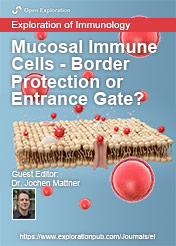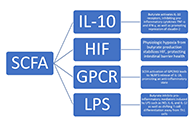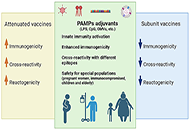-
 Special Issue Topic
Special Issue TopicMucosal Immune Cells - Border Protection or Entrance Gate?
Submission Deadline: July 31, 2023Guest Editor
Jochen Mattner E-Mail
Associate Professor, Institute of Clinical Microbiology, Immunology and Hygiene, FAU Erlangen-Nürnberg and UKER, Erlangen, Germany
Research Keywords: Host-pathogen interactions, mucosal immunology, innate immune responses, immune-mediated diseases
About the Special Issue
Multiple immune cell populations line the muco-epithelial borders of our body. Continuous exposure of these interfaces to the environment as well as to diverse microorganisms and their metabolites reflects the biological necessity for a multifaceted, integrated epithelial and immune cell-mediated regulatory system. Thus, the cellular components of this regulatory system need to discriminate invading pathogens from harmless microbiota to which they form the first line of defense or have to be tolerant to, respectively. For these complex interactions underlying the balance between pro- and anti-inflammatory processes, myeloid cell, regulatory T cell or intraepithelial lymphocyte populations are equipped with unique receptors and signaling circuits. Disruptions of these versatile processes can turn regulatory into inflammatory immune responses that underlie the pathogenesis of many complex immune-mediated disorders. Elucidation of the mechanisms through which disrupted signaling circuits and/or altered receptor expression/function turn regulatory into inflammatory immune cells can help to devise targeted and personalized tools for the diagnosis, therapy and prevention of immune-mediated disorders and/or infectious disease.
In this Special Issue, we welcome original articles, reviews, case reports, preclinical and clinical studies.
Keywords: mucosa-associated microenvironment, auto-immunity, immunotherapy, immune evasion, T regulatory cells, intra-epithelial lymphovytes, microbiota, metabolites, NGS, trascriptomics, metabolomics, myeloid cell populations, cell signaling, disease pathogenesis, colonization resostance, infectious disease
Call for Papers
Published Articles
 Nutritional effects on mucosal integrity and immune functionOpen AccessReviewThe intestinal mucosal barrier plays a critical role in maintaining the integrity of the gastrointestinal (GI) tract and protecting the body from harmful toxins and pathogens. Nutrition additionally [...] Read more.Lindsey B. Cundra ... David A. JohnsonPublished: February 28, 2024 Explor Immunol. 2024;4:90–105
Nutritional effects on mucosal integrity and immune functionOpen AccessReviewThe intestinal mucosal barrier plays a critical role in maintaining the integrity of the gastrointestinal (GI) tract and protecting the body from harmful toxins and pathogens. Nutrition additionally [...] Read more.Lindsey B. Cundra ... David A. JohnsonPublished: February 28, 2024 Explor Immunol. 2024;4:90–105
DOI: https://doi.org/10.37349/ei.2024.00130 Trained-immunity and cross-reactivity for protection: insights from the coronavirus disease 2019 and monkeypox emergencies for vaccine developmentOpen AccessReviewThe emergence and re-emergence of pathogens is a public-health concern, which has become more evident after the coronavirus disease 2019 (COVID-19) pandemic and the monkeypox outbreaks in early 2022 [...] Read more.Amanda Izeli Portilho, Elizabeth De GaspariPublished: August 24, 2023 Explor Immunol. 2023;3:276–285
Trained-immunity and cross-reactivity for protection: insights from the coronavirus disease 2019 and monkeypox emergencies for vaccine developmentOpen AccessReviewThe emergence and re-emergence of pathogens is a public-health concern, which has become more evident after the coronavirus disease 2019 (COVID-19) pandemic and the monkeypox outbreaks in early 2022 [...] Read more.Amanda Izeli Portilho, Elizabeth De GaspariPublished: August 24, 2023 Explor Immunol. 2023;3:276–285
DOI: https://doi.org/10.37349/ei.2023.00102 -
-
Ongoing Special Issues
-
Completed Special Issues